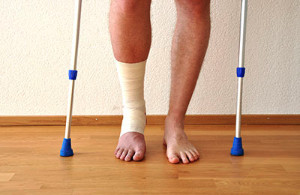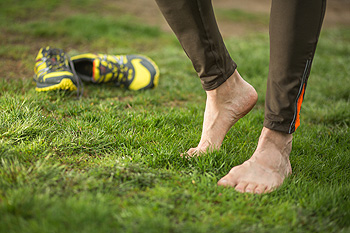May 2019
Are You Suffering From Ingrown Toenails?
Edema and Pregnancy
Many pregnant women notice their feet have become swollen. This is caused by the pressure that is put on the lower limbs, which is often the result of a growing fetus. The medical term for excessive swelling is referred to as edema, and is a common ailment in a large percentage of pregnant women. It is beneficial to wear shoes that are comfortable, and elevating the legs frequently during the day may bring mild relief. Additionally, the feet may swell as a result of high blood pressure. Research has shown if one foot becomes swollen, it may be indicative of an existing medical condition. If you would like additional information about how pregnancy affects the feet, it is suggested that you schedule a consultation with a podiatrist.
Pregnant women with swollen feet can be treated with a variety of different methods that are readily available. For more information about other cures for swollen feet during pregnancy, consult with Joseph D. Ruffo, DPM, PC from New York. Our doctor will attend to all of your foot and ankle needs.
What Foot Problems Can Arise During Pregnancy?
One problem that can occur is overpronation, which occurs when the arch of the foot flattens and tends to roll inward. This can cause pain and discomfort in your heels while you’re walking or even just standing up, trying to support your baby.
Another problem is edema, or swelling in the extremities. This often affects the feet during pregnancy but tends to occur in the later stages.
How Can I Keep My Feet Healthy During Pregnancy?
- Wearing orthotics can provide extra support for the feet and help distribute weight evenly
- Minimize the amount of time spent walking barefoot
- Wear shoes with good arch support
- Wear shoes that allow for good circulation to the feet
- Elevate feet if you experience swelling
- Massage your feet
- Get regular, light exercise, such as walking, to promote blood circulation to the feet
If you have any questions please feel free to contact one of our offices located in Sea Cliff and Babylon, NY . We offer the newest diagnostic and treatment technologies for all your foot and ankle needs.
Types of Running Injuries
Research has indicated that many runners get injured every year. Running injuries can be prevented when properly fitted shoes are worn, and stretching techniques are implemented. A common injury is referred to as Achilles tendinitis, which is typically caused by tight calf muscles. The Achilles tendon can be strengthened by performing heel raises several times before running. If you have plantar fasciitis, you are most likely familiar with the pain that exists in the heel of the foot. Mild relief may be found when the plantar fascia is properly stretched. This is accomplished by pulling your toes gently away from your foot, in addition to rolling the bottom of your foot on a frozen water bottle or tennis ball. If you would like more information about how to prevent running injuries, it is suggested that you counsel with a podiatrist.
Exercising your feet regularly with the proper foot wear is a great way to prevent injuries. If you have any concerns about your feet, contact Joseph D. Ruffo, DPM, PC of New York. Our doctor will treat your foot and ankle needs.
How to Prevent Running Injuries
Many common running injuries are caused by overuse and overtraining. When the back of the kneecap starts wearing out and starts causing pain in your knee, this is commonly referred to as runner’s knee. Runner’s knee is a decrease in strength in your quadriceps and can occur if you’re not wearing properly fitted or supporting shoes. To prevent runner’s knee, focusing on hip strengthening is a good idea, as well as strengthening your quads to keep the kneecaps aligned.
What Are Some Causes of Running Injuries?
- One cause of a common running injury is called iliotibial band syndrome.
- Plantar fasciitis is also another common injury.
- Stress fractures can occur from overtraining, lack of calcium, or even your running style.
Best Ways to Prevent Running Injuries
- Wear footwear that fits properly and suits your running needs.
- Running shoes are the only protective gear that runners have to safeguard them from injury.
- Make a training schedule. Adding strengthening exercises as well as regular stretching can help keep you strong and limber and can lessen the possibility of injuries.
- Stretching keeps muscles limber; this will help you gain better flexibility.
If you have any questions please feel free to contact one of our offices located in Sea Cliff and Babylon, NY . We offer the newest diagnostic and treatment technologies for all your foot and ankle needs.
Healing Time Frame for Stress Fractures
 Stress fractures are tiny cracks in the bones of the feet. They occur as a result of participating in activities that cause the bones in the foot to weaken and crack faster than the healing process can begin. This can occur due to several reasons, including training in your chosen sport before adequate healing has been completed, increasing the amount of time training in a short period of time, or running on different surfaces. The symptoms that are associated with stress fractures often include swelling, burning pain, and difficulty walking on the affected foot. Effective treatment begins with staying off the foot for several weeks, depending on the severity of the injury. This can be accomplished by wearing a cast. If you have sustained a stress fracture, speak to a podiatrist who can guide you toward proper treatment options.
Stress fractures are tiny cracks in the bones of the feet. They occur as a result of participating in activities that cause the bones in the foot to weaken and crack faster than the healing process can begin. This can occur due to several reasons, including training in your chosen sport before adequate healing has been completed, increasing the amount of time training in a short period of time, or running on different surfaces. The symptoms that are associated with stress fractures often include swelling, burning pain, and difficulty walking on the affected foot. Effective treatment begins with staying off the foot for several weeks, depending on the severity of the injury. This can be accomplished by wearing a cast. If you have sustained a stress fracture, speak to a podiatrist who can guide you toward proper treatment options.
Stress fractures occur when there is a tiny crack within a bone. To learn more, contact Joseph D. Ruffo, DPM, PC from New York. Our doctor can provide the care you need to keep you pain free and on your feet.
How Are They Caused?
Stress fractures are the result of repetitive force being placed on the bone. Since the lower leg and feet often carry most of the body’s weight, stress fractures are likely to occur in these areas. If you rush into a new exercise, you are more likely to develop a stress fracture since you are starting too much, too soon. Pain resulting from stress fractures may go unnoticed at first, however it may start to worsen over time.
Risk Factors
- Gender – They are more commonly found in women compared to men.
- Foot Problems – People with unusual arches in their feet are more likely to develop stress fractures.
- Certain Sports – Dancers, gymnasts, tennis players, runners, and basketball players are more likely to develop stress fractures.
- Lack of Nutrients – A lack of vitamin D and calcium may weaken the bones and make you more prone to stress fractures
- Weak Bones – Osteoporosis can weaken the bones therefore resulting in stress fractures
Stress fractures do not always heal properly, so it is important that you seek help from a podiatrist if you suspect you may have one. Ignoring your stress fracture may cause it to worsen, and you may develop chronic pain as well as additional fractures.
If you have any questions, please feel free to contact one of our offices located in Sea Cliff and Babylon, NY . We offer the newest diagnostic and treatment technologies for all your foot care needs.
Possible Causes and Symptoms of an Achilles Tendon Injury
 The Achilles tendon is the largest tendon in the body. It is located in the back of the leg, and its function is to connect the foot to the leg muscles. The injury that is known as Achilles Tendinitis often occurs as a result of small tears that can negatively affect the strength of the tendon. There are several reasons why this injury occurs. These may include running on uneven surfaces, having weak or tight calf muscles, or a sudden increase in activity level. A common symptom that is associated with this condition is typically pain and discomfort in the back of the leg, especially in the morning hours. Additionally, that area of the leg may be swollen, it is possible to notice a decrease in strength. If you have an Achilles tendon injury, it is suggested to rest the foot, and consult with a podiatrist as quickly as possible who can guide you toward beginning the proper treatment.
The Achilles tendon is the largest tendon in the body. It is located in the back of the leg, and its function is to connect the foot to the leg muscles. The injury that is known as Achilles Tendinitis often occurs as a result of small tears that can negatively affect the strength of the tendon. There are several reasons why this injury occurs. These may include running on uneven surfaces, having weak or tight calf muscles, or a sudden increase in activity level. A common symptom that is associated with this condition is typically pain and discomfort in the back of the leg, especially in the morning hours. Additionally, that area of the leg may be swollen, it is possible to notice a decrease in strength. If you have an Achilles tendon injury, it is suggested to rest the foot, and consult with a podiatrist as quickly as possible who can guide you toward beginning the proper treatment.
Achilles tendon injuries need immediate attention to avoid future complications. If you have any concerns, contact Joseph D. Ruffo, DPM, PC of New York. Our doctor can provide the care you need to keep you pain-free and on your feet.
What Is the Achilles Tendon?
The Achilles tendon is a tendon that connects the lower leg muscles and calf to the heel of the foot. It is the strongest tendon in the human body and is essential for making movement possible. Because this tendon is such an integral part of the body, any injuries to it can create immense difficulties and should immediately be presented to a doctor.
What Are the Symptoms of an Achilles Tendon Injury?
There are various types of injuries that can affect the Achilles tendon. The two most common injuries are Achilles tendinitis and ruptures of the tendon.
Achilles Tendinitis Symptoms
- Inflammation
- Dull to severe pain
- Increased blood flow to the tendon
- Thickening of the tendon
Rupture Symptoms
- Extreme pain and swelling in the foot
- Total immobility
Treatment and Prevention
Achilles tendon injuries are diagnosed by a thorough physical evaluation, which can include an MRI. Treatment involves rest, physical therapy, and in some cases, surgery. However, various preventative measures can be taken to avoid these injuries, such as:
- Thorough stretching of the tendon before and after exercise
- Strengthening exercises like calf raises, squats, leg curls, leg extensions, leg raises, lunges, and leg presses
If you have any questions please feel free to contact one of our offices located in Sea Cliff and Babylon, NY . We offer the newest diagnostic tools and technology to treat your foot and ankle needs.












